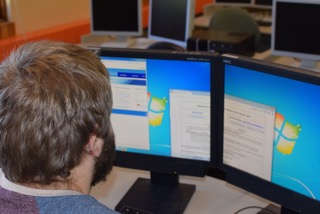Students caught between convenience and challenge
Enrollment for online classes has been increasing, but the challenge of learning off-campus still persists for some

Luke Lee, junior computer science major, is enrolled only in classes taking place on campus–the only option for his major.
July 20, 2016
Over the past five years, Central has seen a rise in the number of students taking online classes, especially in the summer.
According to data provided by Central’s Public Affairs office, this summer the current number of students enrolled in in-person classes is 1,645 compared to the 2,994 students enrolled in strictly online only classes.
The ease of taking classes online is a potential reason for the rise in attendance. As long as a student has the resources, they can take the class from practically anywhere.
The number of online students increase when taking “hybrid” classes into account. These classes are a mix of both online content and face to face interaction.
Central administration no longer refers to totally web based classes as “online classes” due to the fact that the majority of courses at the university require the internet in one way or another.
Central’s Computer Science Department is one of the only departments that isn’t offering any online classes this summer.
There is no single department policy keeping them from offering any online classes. The problem with the online element is how difficult it could be for some students to take tests. The department requires that tests have a proctor, which means students will have to be on campus. Something that is doable for someone living in Yakima, but not someone in a different state.
There are some classes that are labeled as in-person, but the students only have to be on campus for exams.
One issue with summer classes that has become apparent is how short and condensed they are. The majority of classes taught this summer are for the six-week session as opposed to the nine-week session.
There is no policy stating that professors can only teach six-week courses. Class length is up to them and their preference.
According to Aaron Montgomery, interim department chair for computer science at Central, faculty who teach during the summer earn around one-third of their pay and would have to be in town to teach.
The faculty pay is the same amount for both sessions, so often times they prefer the session that keeps them here for the shortest amount of time.
If the class is too small, that faculty member will have to take a pay cut, leaving little incentive to stay on campus and teach.
Condensed classes pose a challenge to students who are taking more than one class, especially if they are online. But in theory the students should have enough time to focus on classwork due to it being the summer.
This is not the case for all students and some still struggle with online and condensed classes.
“I think the most challenging thing is that you have to teach yourself the material,” said Molly Shanks, a senior family and consumer science education major.
On Central’s website they offer advice on several areas that students should take into consideration before enrolling into an online class including: computer literacy, strong reading and writing skills, self-motivation and time management.
According to the website, students will have to work just as hard– if not harder–in an online class than they would in a regular in-person class. Students should expect to dedicate at least 12 hours a week for a three credit class.
“I don’t think teachers of online classes do much teaching, I think they do a lot of assigning and hoping for the best,” Shanks said.
Some of the classes will require a lot of self-teaching and have limited input from professors.
Students will also have to be active learners to be successful in online classes. They will have to remember to ask questions and seek help whenever needed because they professor will not be able to see them struggling in-person.
“Student’s that do well in online classes are students that can teach themselves,” Montgomery said.
*Editor’s note: Staff Reporter Ray Payne is currently an intern in Central’s Public Affairs office. Information pertaining to the office has been checked for accuracy by editorial staff.

